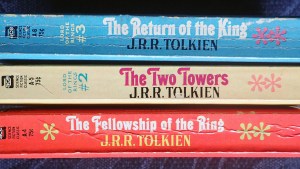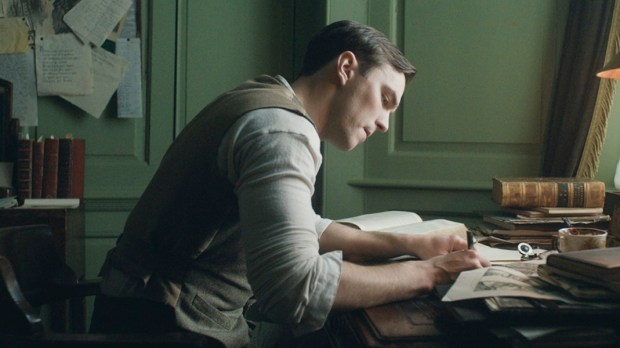In the new biopic Tolkien, fledgling writer and soon-to-be philologist J.R.R. Tolkien (played by Nicholas Hoult) discusses language with Edith Bratt (Lily Collins), the girl he loves. But he’s not just talking about any language: He’s discussing his languages—the ones he’s creating from scratch. He mentions the word “celador” as being an especially beautiful word, a word which has no meaning (yet) but falls from the tongue like honeyed water.
Edith doesn’t get it. She makes a reference to the English phrase the word sounds like, the prosaic “cellar door.”
“Things aren’t beautiful because of how they sound,” Edith says. “They’re beautiful because of what they mean.” And she makes him begin telling her a story about the magical, mythical “celador,” giving the word meaning and depth and resonance.
It’s a nice moment, and one kinda-sorta pulled from Tolkien’s life. (He was known to discuss the tonal beauty of the phrase “cellar door”). But it also unintentionally sums up the movie’s biggest problem: Tolkien, the movie, spends its time unpacking the passions of the Lord of the Rings author when he was a young man—his languages, his friendships, the love of his young life. But it misses its meaning, especially the meaning that Tolkien’s Catholic faith gave to his whole being and his work.
Granted, the movie takes place at a time when, according to director Dome Karukoski in America magazine, Tolkien was a “bad Catholic and didn’t go to church.” He also says that faith is also difficult to portray on screen. Karukoski said so himself in a special, pre-movie interview during select advance screenings of Tolkien. He told talk-show host (and celebrity Tolkien geek) Stephen Colbert that he tried to illustrate Tolkien’s Catholicism, but that scenes depicting it fell flat with test audiences.
“Visualizing religion is one of the most difficult things [to do] on film,” Karuoski says.
Even so, I think Tolkien misses several opportunities to organically express the importance of the Catholic faith to Tolkien and the entire Tolkien family. Moreover, the nods that are given to Tolkien’s Catholicism are rather superficial and, at times, conflicted.
For instance, take the time we spend with Mabel Tolkien, J.R.R.’s widowed mother. Mabel’s most animated moments come when she’s telling fantastical stories to Tolkien and his brother, Hilary. That’s fine. But her involvement with the Catholic Church is summarized with one line that sounds, in context, almost apologetic: “Boys, we are going to face some difficult times, and we are lucky to have the Church to support us,” she says.
The film doesn’t spend a second of unpacking how Mabel joined the Church—which must’ve been a fascinating story in its own right. After all, the and her sister converted to Catholicism in Anglican England in 1900, at a time when anti-Catholic sentiment in the country was strong and severe. The fallout for Mabel was even worse than it would have been for most: When she converted, her devout Baptist family essentially disowned her, cutting off all financial assistance. Not the best situation for a sick widow with two young sons to support.
When the movie says that the Tolkiens had the “Church to support us,” that’s true enough. But the movie spends not a nanosecond explaining why that support was necessary—or the obviously deep and sacrificial leap of faith that Mabel made to be a Catholic. She died just four years after her conversion from complications stemming from diabetes. Ever after, Tolkien considered her a martyr for the faith.
The film spends more time with Father Francis Xavier Morgan, the priest who looked after Tolkien and brother Hilary after Mabel’s untimely death. He’s portrayed as a kindly figure, but his biggest impact comes when he forbids Tolkien to see Edith until his 21st birthday.
That’s a fact, according to Tolkien’s biographers. But focusing so tightly on that one moment in their relationship turns Father Francis into a quasi-antagonist. The truth is, Father Francis had a profoundly positive influence on Tolkien and, later, his wife Edith (who also converted to Catholicism). Tolkien and Francis were so close that Tolkien named his first-born son after the priest. The name isn’t the only thing Tolkien took, either — some say the author started smoking a pipe because of Francis, too.
“He was more than a father to me,” the real Tolkien later wrote. “I first learned charity and forgiveness from him.”
The faith of Tolkien’s mother and Father Francis impacted the writer deeply, and his deep faith found its way into The Lord of the Rings, which Tolkien called a “fundamentally religious and Catholic work.”
He loved Edith, yes. He loved his languages. He treasured the relationships he had with his friends, all of which the film illustrates well and, at times, beautifully. But above all, it seems that Tolkien treasured his faith the most, an aspect of him that the film minimizes. He once wrote this to his son:
“Out of the darkness of my life, so much frustrated, I put before you the one great thing to love on earth: the Blessed Sacrament … There you will find romance, glory, honor, fidelity, and the true way of all your loves upon earth.”
Clearly, any biography of Tolkien, movie or otherwise, should deal with this — the source of grace and strength that motivated Tolkien to the end of his days. Tolkien, the movie, treats his faith as almost an afterthought. Given that its subject was an author who dealt with layer upon layer of meaning in his own work, it seems more than a missed opportunity. It’s a frustrating disappointment.

Read more:
How a 5-year-old boy inspired J.R.R.Tolkien’s ‘Lord of the Rings’

Read more:
The secret love story behind J.R.R. Tolkien’s romantic characters in ‘The Lord of the Rings’

